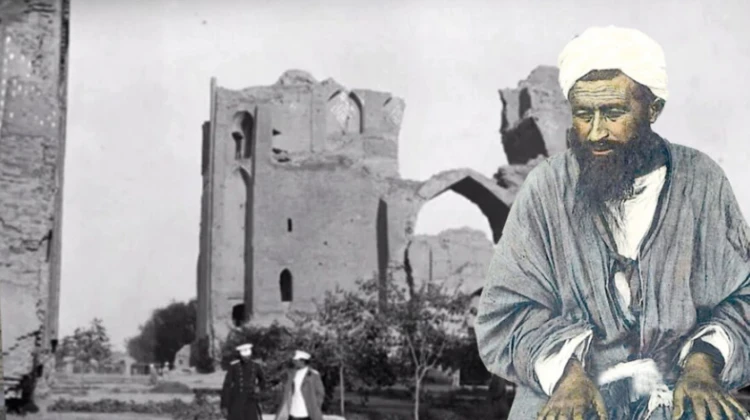The Legend of the Fallen Minaret During the Lifetime of Dukchi Ishan
Much about the appearance of Dukchi and his charisma is conveyed by the so-called legend of the fallen minaret, which was quite popular during the life of the ishan and later recounted in one of his biographies.
This concerns the collapsed minaret, built in 1890. A few years later, due to the increasing number of worshippers in the mosque and murids, there arose a need to reconstruct the mosque. The craftsmen decided to dismantle the old minaret made of raw brick and erect a new one from burnt brick. However, Dukchi Ishan ordered that only the old minaret be raised, adding a new upper part made of burnt brick. "Quite soon, the foundation of the minaret made of raw brick began to crack, and the minaret tilted. Again, some of the servants of the khanaka suggested dismantling it, but the majority of the murids declared that 'the minaret will stand like this until the Day of Judgment thanks to the karamat of the lord Ishan; he said that [the angel of death] Azrail would blow his trumpet while standing on top of this minaret.' Nevertheless, contrary to the karamat of the Ishan, the minaret, along with the mu'azzin who had climbed it, collapsed onto the school built at its foot. 23 students, a teacher, and the mu'azzin were killed, and another 15 children were injured." It should be noted that a significant portion of the murids continued to believe in the karamat of the Ishan even after this incident, and many parents of the deceased children considered it a fortunate omen that their children were "crushed by the minaret of hadrat Ishan."
Additionally, the commitment to the cult of poverty, renunciation of all worldly matters, refusal to cooperate with the authorities, and steadfast endurance of suffering and deprivation, as with the early Sufis, distinguished Dukchi Ishan from the official Muslim clergy. As for the uprising itself, the Anonymous Life of Dukchi Ishan - the leader of the Andijan uprising of 1898, Manafib-i Dukchi Ishan - indicates the ishan's critical attitude towards high-ranking religious and secular clans, which ultimately led to the negative
attitude of the official clergy towards him and the uprising he led. "Dukchi Ishan clearly distinguished 'their religion,' 'their understanding of sharia,' of which he evidently considered himself and all his 'flock' to be the bearers. This attitude is quite understandable, as it is known that religious ethics stem from the interests of various strata of society that formally profess one religion. The undisguised opposition and the positioning of himself against the 'higher' spiritual and secular aristocrats (in Dukchi Ishan's words, who had lost the 'true faith') deprived the uprising of the possible support of the majority of local administration officials, clans, and wealthy individuals.
Ishan from the village of Min-Tyube by the nickname "Dukchi"
Read also:

Togolok Moldo on Natural Phenomena
The objects and phenomena of the material world are diverse, and accordingly, the interactions and...
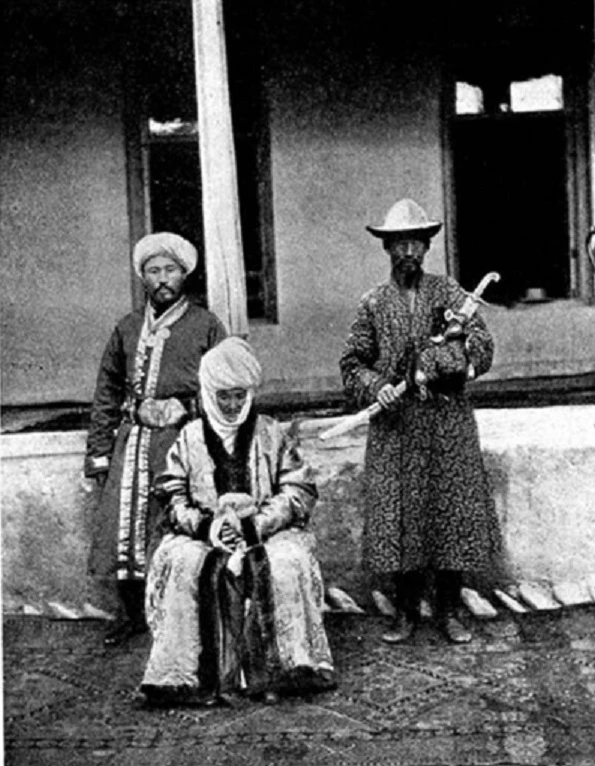
How the Alai People Were Saved from Disaster Thanks to the "Queen of Alai"
The ideas and sentiments of the rebels found sympathizers among the Kyrgyz nomads, as evidenced by...
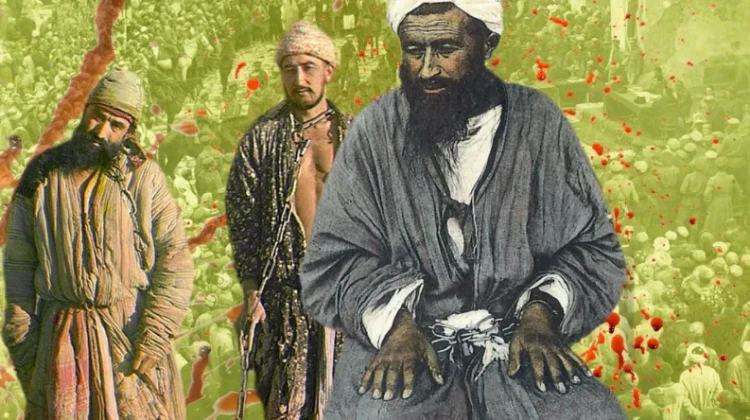
The Ishan from the Min-Tyube Village by the Nickname "Dukchi"
The uprising was led by a certain Magomed Ali Khalif Muhammad-Sabir Ogly - the ishan from the...

The Legend of the Ghazawat - the Sacred War
GAZAVAT In early spring of 1898, alarming rumors began to spread in many villages of Fergana. It...

Types of Higher Plants Listed in the "Red Book" of Kyrgyzstan (1985)
Species of higher plants removed from the "Red Book" of Kyrgyzstan (1985) Species of...
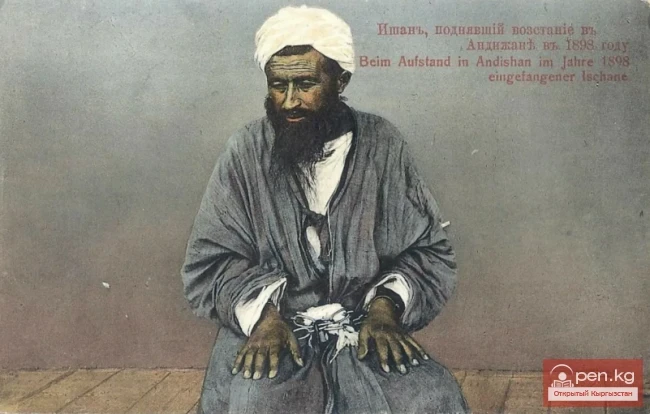
Who is Madali Ishan?
Military Prosecutor of the Turkestan Military District Court, Major General Dolinsky on Madali...

The Legend of Kuu-Kumpa
There is a legend among the people. The itelgi and the berkut were enemies, as the berkut often...

Types of Insects Excluded from the Red Book of Kyrgyzstan
Insect species excluded from the Red Data Book of Kyrgyzstan Insect species excluded from the Red...

The Legend of Barskoon
"Barskoon" Barskoon is the name of a village located on the shores of Lake Issyk-Kul....
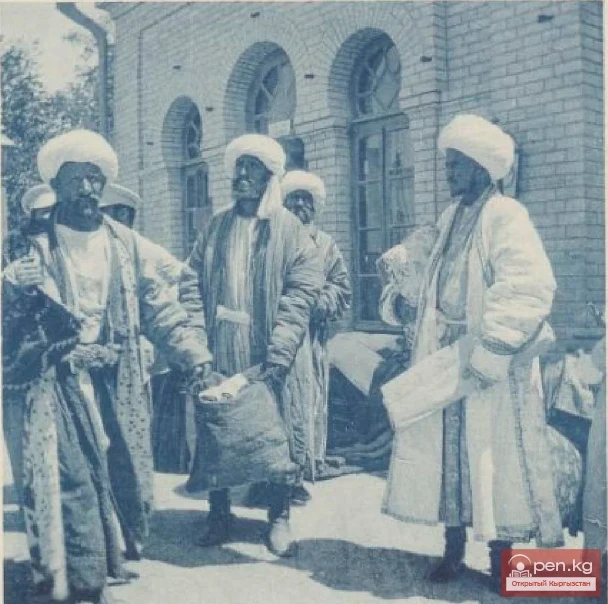
The Heterogeneous Social Composition of the Performance of the Peoples of Central Asia in May 1898.
The Heterogeneous Social Composition of the Uprising of the Peoples of Central Asia in May 1898 In...
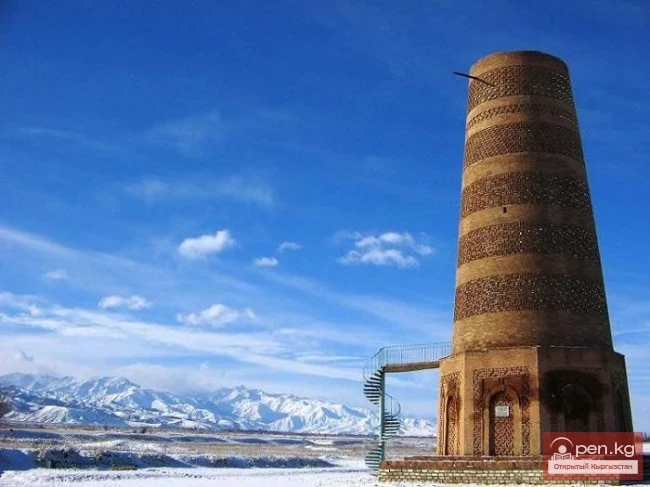
The Legend of the Tower of Buran
Once, Khan Baytik decided to capture Tokmak. Not far from the city, in a gorge, he left his...
"Manas" Epic 3D Format
Kyrgyz from China are creating a cartoon in 3D format based on the "Manas" epic. This...

The Legend of the Lake
Long ago, in the Issyk-Kul basin, there was a city, around which stood a castle atop a steep...
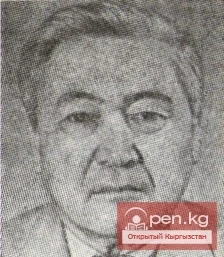
Prose Writer, Translator Bakan Sexenbaev
Prose writer and translator B. Sexenbaev was born on August 20, 1932, in the village of Burana,...

The Legend of Issyk-Kul
How Lake Issyk-Kul Came to Be Many legends have been woven by the people about how Lake Issyk-Kul...
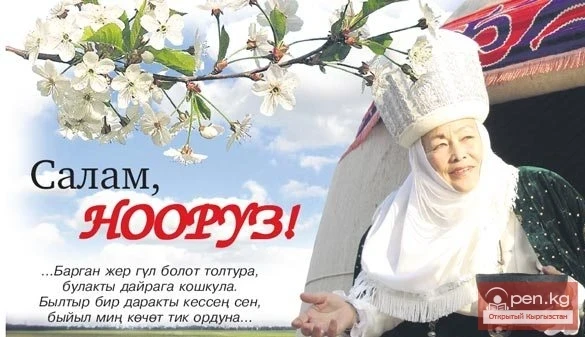
Nauryz (New Year)
On the day of the meeting of the Jaz Mayram — the spring holiday, people usually dressed...
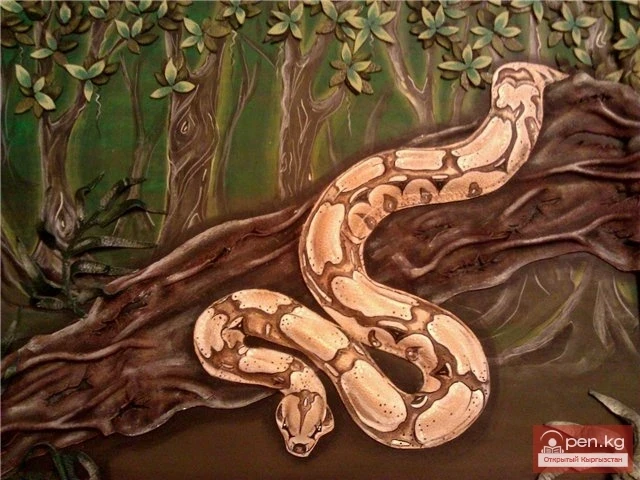
The Legend of the Snake Venom
Once upon a time, there lived three orphaned brothers. Every day they went to the forest to gather...
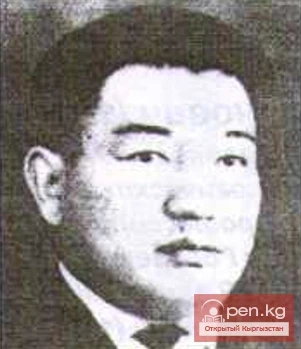
Jursun Suvanbekov
Suvanbekov Jursun (1930-1974), Doctor of Philological Sciences (1971) Kyrgyz. Born in the village...
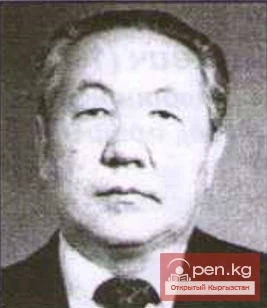
Zakirov Saparbek
Zakir Saparbek (1931-2001), Candidate of Philological Sciences (1962), Professor (1993) Kyrgyz....
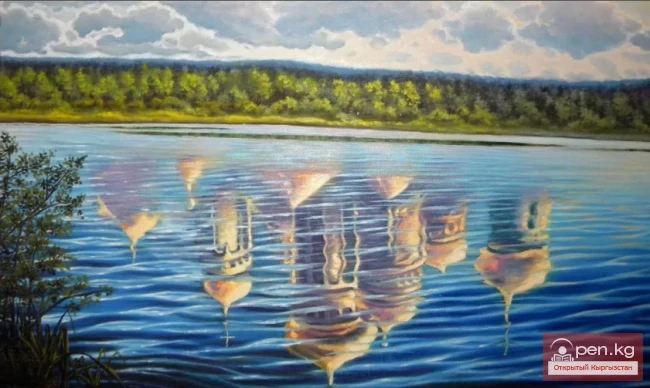
The Legend of the City of Kitezh
RUSSIAN CITY OF KITEZH AT THE BOTTOM OF ISSYK-KUL? Back in the 1960s, the already recognized...
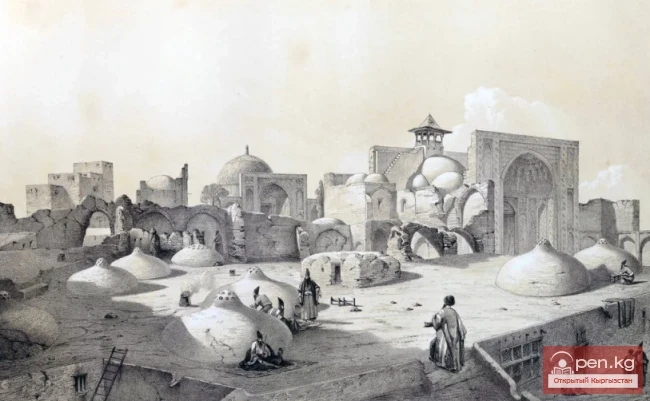
The Legend of the Founding of Barshana
BARS KHAN An analysis of the legend provided by Gardizi to explain the etymology of the toponym...

The Legend of the Lake "Kokuy-Kul"
"Kokuy-Kul" Among the high mountains lies a small but very deep lake called Kokuy-Kul....
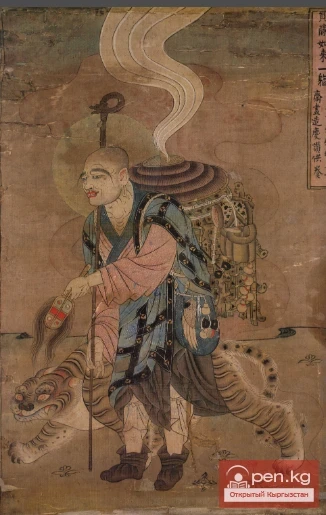
The Legend of the Journey of Xuánzàng
THE JOURNEY OF XUANZANG In the early 7th century, one of the remarkable travelers of the Middle...
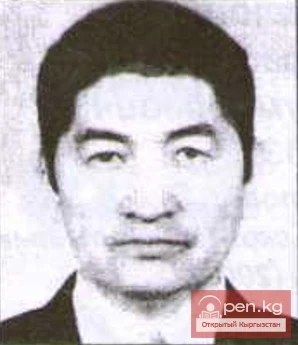
Chorotegin (Choroev) Tynchtykbek Kadyrmambetovich
Chorotegin (Choroев) Tynchtykbek Kadyrmambetovich (1959), Doctor of Historical Sciences (1998),...
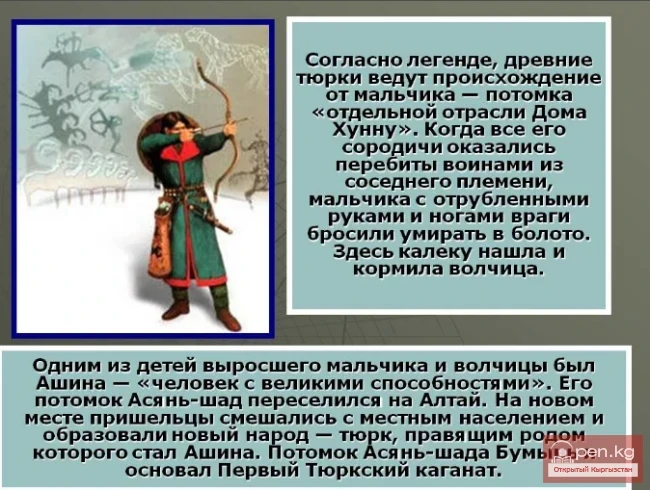
The Legend of the Origin of the Turks
Chinese Chronicles on the Origin of the Turks Ancient Turkic legends have been preserved in...
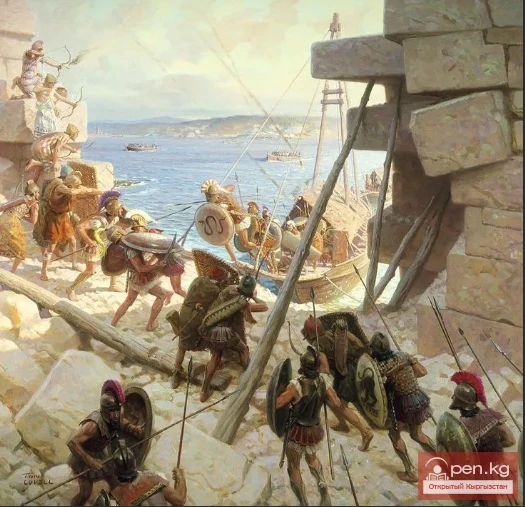
The Legend of the City of Barskhan
BARSKHAN - THE CITY OF ALEXANDER THE GREAT The medieval historian of the Persian and Arab world,...

Zhanibek Raevich Kozhokulov
Kozhokulov Zhanibek Raevich Painter. Born on July 27, 1961, in the Engels name section of the...
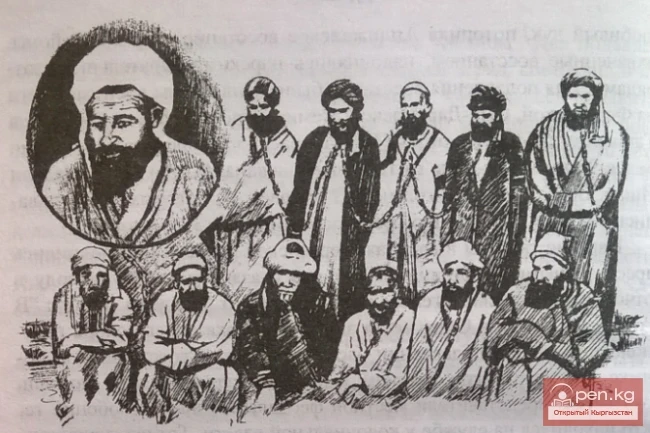
The Execution of Madali Ishan and His Associates
Madali Ishan and other participants of the uprising before execution Colonial Authority Against...
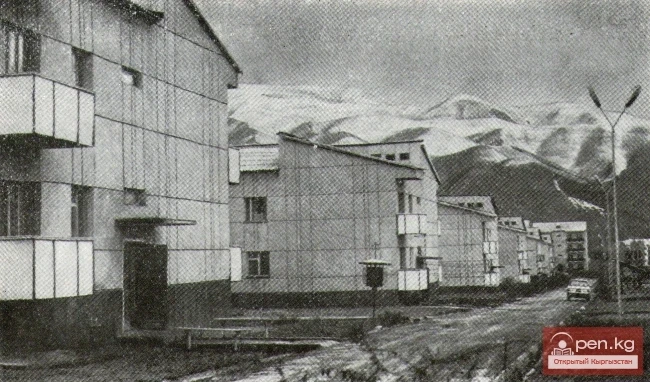
SHERALIEV Tokon Matkasymovich
SHERALIEV Tokon Matkasymovich...

Poet, Translator Mikhail Ronkin
Poet and translator M. Ronkin was born on October 23, 1928, in Smolensk in a working-class family....

The band "Lesopoval" is coming to our capital city Bishkek on September 21, 2019.
On September 21, 2019, a true legend of Russian chanson – the band 'Lesopoval' (M....
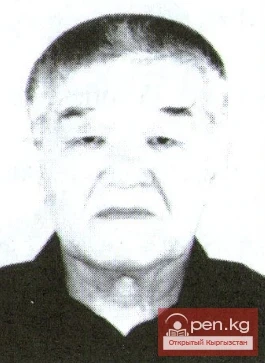
Aitbek Sadyrkulovich Akmatov
Akmatov Aitbek Sadyrkulovich Applied artist. Works in the field of book illustration. Born on...

The Legend of the Issyk-Kul "Atlantis"
WORD ABOUT THE TREASURES OF THE KYRGYZ "ATLANTIS" From the 3rd to the 6th centuries,...
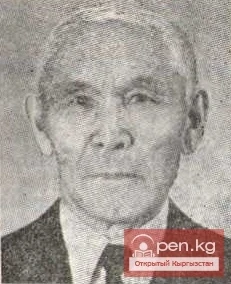
Literary scholar, prose writer, poet Dzaki Tashtemirov
Literary scholar, prose writer, poet Dz. Tashtemirov was born on October 15, 1913—October 7, 1988,...
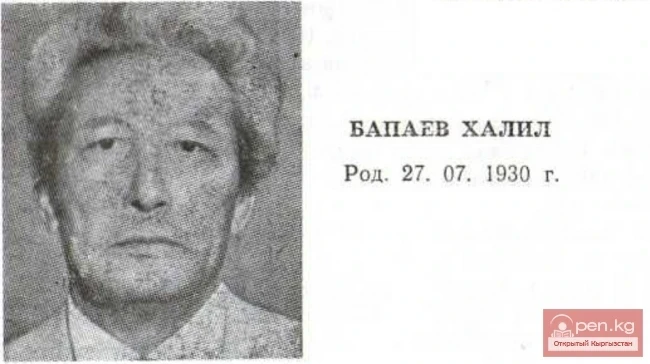
Critic, Literary Scholar Khalil Bapaev
Critic, literary scholar X. Bapaev was born in the village of Alim-Tep in the Karasuu district of...

Rajal and Kaiyr
Among the Kyrgyz, there is a preserved legend-myth. In those distant times, when the world was...
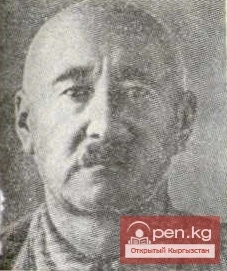
Poet-Writer Abdykalyk Chorobaev
Poet-writer A. Chorobaev was born on 1. 1897—11. 12. 1979 in the village of Kurtka (now...

Tourist Area Management Program
The project "USAID Business Development Initiative" (BGI), within the tourism...
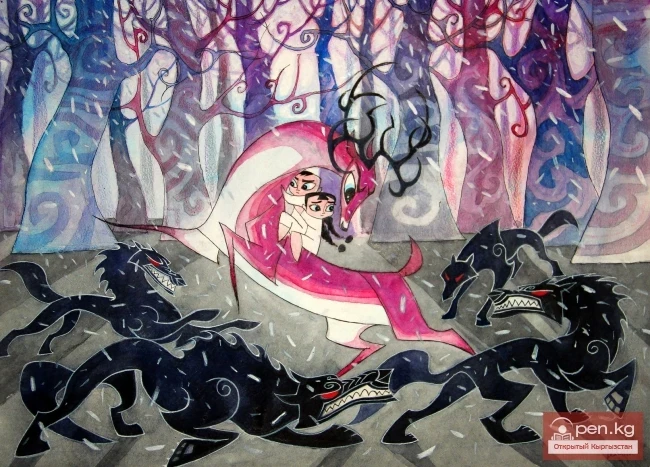
The Legend of the Extermination of the Kyrgyz and the Mother-Deer
Mother-Deer An ancient unwritten law of human existence states: when a person is mourned and...

The Legend of the City of Chigu
THE CITY OF THE RED VALLEY Chigu (Chigucheng — in Chinese sources "The City of the Red...
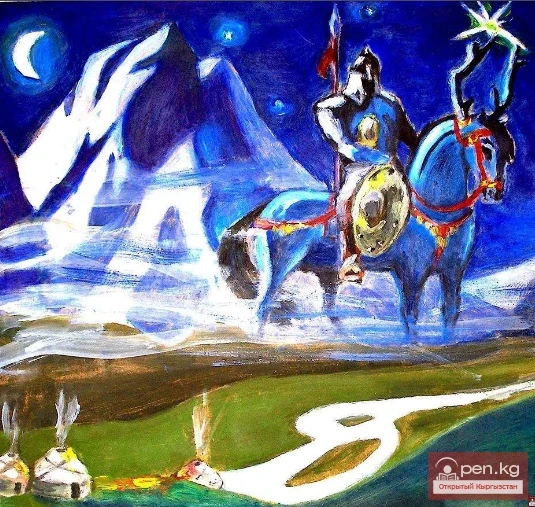
The Legend of the Origin of the Kyrgyz
THE ORIGIN OF THE KYRGYZ This happened deep in Central Asia many, many years ago. Fierce...
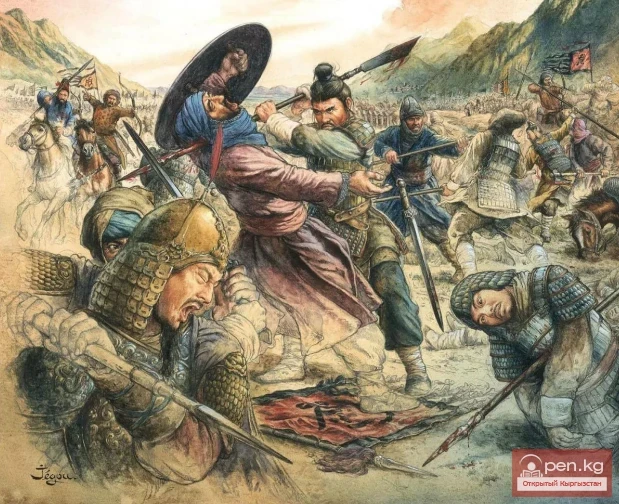
The Legend of the Akchi Battle
THE AKCHIY MASSACRE A dozen horsemen descend a steep path to the river. While the horses drink...
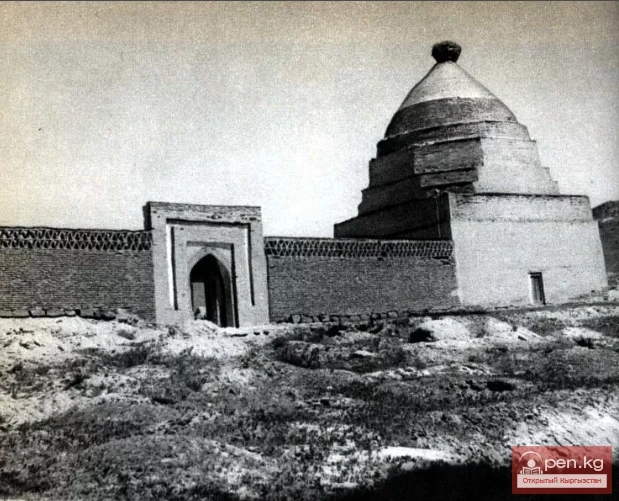
The Legend of Shah-Fazil: Echo of Real Events
THE LEGEND OF SHAH-FAZIL In the mid-7th century, Caliph Hazreti Ali sent eight thousand warriors...
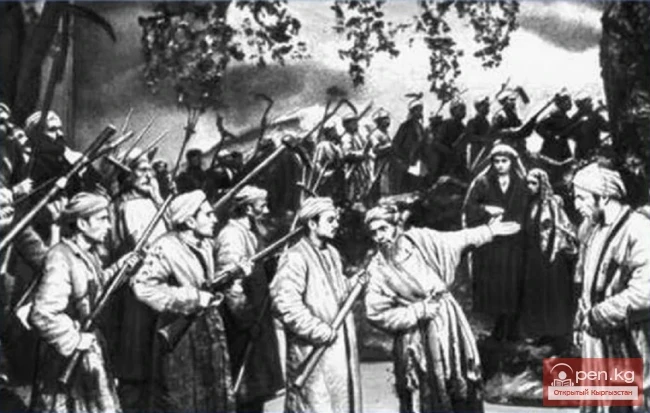
The Andijan Uprising in May 1898
Andijan Uprising In 1885, Dervish Khan made several attempts to incite the local population of the...
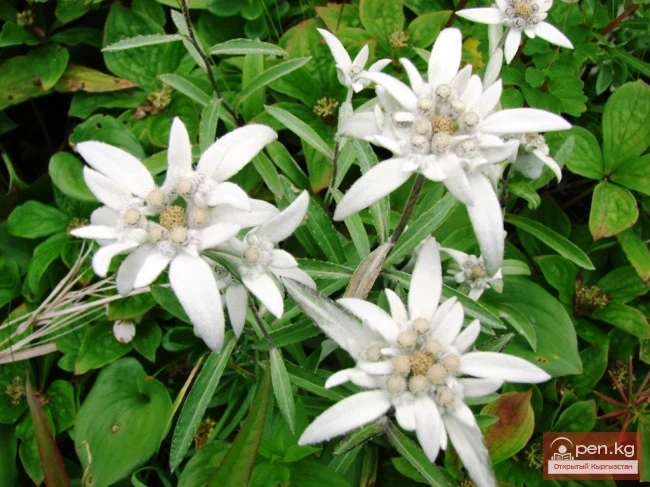
Plants of the Jailoo
In translation from Kyrgyz, "jailoo" means summer pasture. What else do you think this...
